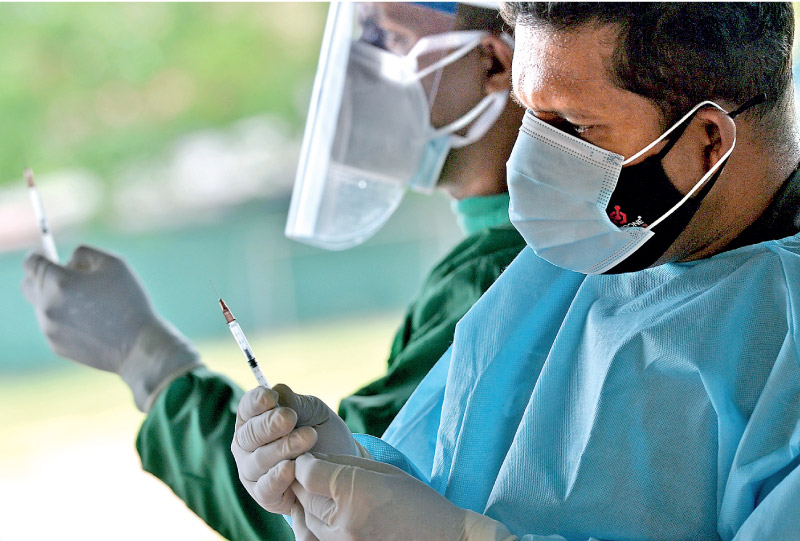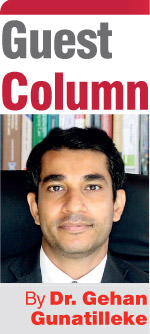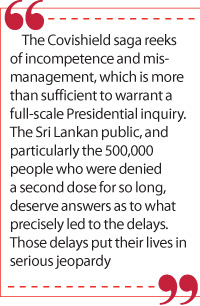Tuesday Feb 17, 2026
Tuesday Feb 17, 2026
Friday, 20 August 2021 01:05 - - {{hitsCtrl.values.hits}}

The Government has indeed rolled out vaccines with considerable speed and efficiency with the support of medical staff and the armed forces. Yet, despite this relative success of the rollout, the question remains whether Sri Lanka could have procured vaccines a lot sooner, and avoided this terrible loss of lives. The President must surely be asking himself who has undermined his vision of a fully vaccinated Sri Lanka – Pic by Shehan Gunasekara
 Vaccines play a vital role in the battle against COVID-19. Countries that have vaccinated a majority of their population are doing better compared to their situation prior to vaccination. The rationale for swiftly and efficiently vaccinating a population seems self-evident.
Vaccines play a vital role in the battle against COVID-19. Countries that have vaccinated a majority of their population are doing better compared to their situation prior to vaccination. The rationale for swiftly and efficiently vaccinating a population seems self-evident.
Sri Lanka’s recent rise in COVID-related deaths would hopefully fall as the number of people fully vaccinated rise. That’s the prevailing theory: if a country vaccinates its population, the death toll will begin to fall. In this context, President Gotabaya Rajapaksa has quite rightly called for the prioritisation of vaccination in the country.
According to a dashboard maintained by the Presidential Secretariat (as of 18 August 2021), the population over 30 years is 11,496,906, and ‘100%’ of these people have received at least one dose. The Dashboard also confirms that only 43% of persons over 30 years of age have been fully vaccinated.
What can this data mean? On the one hand, it is possible that the ‘100%’ figure depicted in the Dashboard is somewhat misleading, as some people over 30 years are still in the process of receiving their first dose. In truth, what the Dashboard states is that 11,963,739 people have received one dose. A vast majority of these people are likely to be over 30 years, but some persons (including frontline workers and students traveling overseas) are likely to be under 30 years.
On the other hand, this data, when read alongside data on COVID-related deaths, signals that delays in vaccinating people are costing Sri Lankan lives. Those who received just one dose are still dying, because one dose is not good enough to ward off the Delta variant of COVID-19. Data released by the Epidemiology Unit of the Ministry of Health this week actually confirmed that during the week ending 13 August 2021, 215 people who died of COVID had actually received the first dose of a vaccine.1 That figure amounted to 25% of the total number of deaths.
So we now know for certain that vaccines save lives. But we also learn that one dose of a vaccine is not always adequate. So a delay in fully vaccinating the population can cost lives.
The Government has indeed rolled out vaccines with considerable speed and efficiency with the support of medical staff and the armed forces. Yet, despite this relative success of the rollout, the question remains whether Sri Lanka could have procured vaccines a lot sooner, and avoided this terrible loss of lives. The President must surely be asking himself who has undermined his vision of a fully vaccinated Sri Lanka.
 Shielding the truth
Shielding the truth
Countries began ordering vaccines back in late 2020, and the countries that secured early orders obviously managed to procure vaccines early. Sri Lanka’s procurement guidelines provide extraordinary powers to the Government to make emergency procurement through any means necessary. According to the existing Guidelines on COVID-19 related Procurement, ‘urgent and exceptional procurements’ above Rs. 25 million can be approved directly by Cabinet.
Sri Lanka’s best bet to receive an early consignment of vaccines was without doubt India’s Serum Institute, which was manufacturing a version of the AstraZeneca vaccine called ‘Covishield’. This vaccine received WHO approval fairly early. As many as 10 million doses were within Sri Lanka’s grasp if the country got its act together and placed the order in time.
The process of bringing down a vaccine entails obtaining approval from Sri Lanka’s National Medicines Regulatory Authority (NMRA). Pre-ordering a vaccine would not require NMRA approval. Such approval would only be required prior to the actual importation of the vaccine.
For whatever reason, no pre-ordering was done, and Sri Lanka waited for NMRA approval before placing an order for Covishield. But the vaccine scandal had only just begun. NMRA, which is no doubt an institution that has the expertise to evaluate vaccines, actually approved the Covishield vaccine on 22 January 2021. Three days later, Sri Lanka received a donation of 500,000 doses of Covishield from India.
NMRA approval was obtained by Serum Institute’s local agent in Sri Lanka. Now, surely we could have expected a cabinet-approved emergency procurement via this local agent the next day itself? We should have ordered ten million doses of Covishield on 23 January 2021. The procurement guidelines authorised Cabinet to place that order immediately.
Instead of doing what the extraordinary situation demanded, the process was needlessly complicated by a bizarre step, which set off a chain reaction of delays.
The local agent for Serum Institute was replaced by the State Pharmaceutical Corporation (SPC), and SPC took over the emergency procurement process. At the time, the decision was justified on the grounds that ‘government-to-government’ procurement required the State’s procurement agency to handle the order. It was also suggested that the Serum Institute wanted to deal exclusively with SPC.
But these claims turned out to be completely false. First, the NMRA report on Covishield makes no mention of SPC.2 It only refers to the local agent. Second, there is not a shred of documentary evidence to suggest that the Serum Institute had made such an unreasonable demand during a crisis. Third, in any event, the Government is currently procuring the Sinovac vaccine through a local agent. So Government procurement does not require SPC to be the sole procuring agency after all.
Instead of placing an order for Covishield immediately, SPC proceeded to obtain a no-objection letter from Serum Institute’s local agent on 3 February 2021, and began the procurement process from square one. It transpired that the purchase agreement had to be approved by the Attorney-General’s Department. Of course, the standard agreement between Serum Institute and the local agent would have sufficed for the emergency procurement. However, when the State’s procurement agency stepped in, the agreement was sent for formal approval by the Attorney-General.
A Cabinet memorandum for the Covishield procurement was thereafter tabled, and Cabinet approval was finally obtained on 22 February 20213 – exactly one month after NMRA approved the vaccine. A period of four weeks is an obscenely long period of time to place an emergency order for life-saving vaccines.
The Cabinet press briefing published thereafter reveals three important facts. First, it confirms the price of a Covishield dose: $ 5.25. This price is crucial to remember. Second, it confirms that Sri Lanka did in fact have 10 million doses of Covishield set aside for it, as the announcement clearly states that Cabinet approved the purchase of 10 million doses ‘as a direct procurement’ from Serum Institute at a sum of $ 52.5 million via SPC. Third, it reveals that Cabinet approved another agreement between SPC and the AstraZeneca Institute of Great Britain to procure 3.5 million doses of AstraZeneca (to this date, no one knows why that procurement failed).
Following this Cabinet announcement, SPC received the first shipment of 500,000 doses of Covishield on 25 February 2021. Then the situation became extremely complicated; what happened next is precisely why no one appears to be demanding answers from the Government.
Serum Institute encountered production problems due to a fire, and India began to experience a serious outbreak of COVID-19 in early March 2021. So the procurement of Covishield had to be suspended due to circumstances beyond anyone’s control. The convenient official narrative was that Serum Institute had defaulted on its commitment. The actual blunder in terms of the failure to pre-order vaccines, and the needless replacement of local agents, thereby further delaying the process, was conveniently shielded from public scrutiny due to these subsequent unavoidable circumstances.
By early March 2021, Sri Lanka had managed to secure only just over 1.2 million doses of Covishield/AstraZeneca. Only 500,000 doses had been procured from Serum Institute. The rest were donations.
Then, with reckless abandon, the Government proceeded to vaccinate approximately 900,000 people with the first dose, leaving just over 300,000 doses left for the second dose. The planning of that vaccination process was obviously based on assurances that SPC would secure more doses of Covishield/AstraZeneca to meet the shortfall. Fast forward to July 2021: over 500,000 people had received only the first dose of Covishield. Over 500,000 people are left completely stranded, and terribly vulnerable to the Delta variant. Meanwhile, research by the Sri Jayewardenepura University revealed that the efficacy of the single dose of Covishield dropped at 16 weeks for those above the age of 60 years.
It was not until 31 July 2021, owing to the generosity of Japan, that Sri Lanka received more AstraZeneca vaccines, and finally began to administer the second dose of AstraZeneca.
 Victims of vaccine politics?
Victims of vaccine politics?
The Covishield saga reeks of incompetence and mismanagement, which is more than sufficient to warrant a full-scale Presidential inquiry. The Sri Lankan public, and particularly the 500,000 people who were denied a second dose for so long, deserve answers as to what precisely led to the delays. Those delays put their lives in serious jeopardy.
Yet incompetence and mismanagement may not be the only things at play. During this period of inexplicable delays in Covishield procurement, another crisis was brewing simultaneously. At the time, the NMRA was refusing to grant the Chinese-manufactured Sinopharm vaccine approval for emergency use in Sri Lanka.
According to media reports, on 8 March 2021, NMRA’s Independent Advisory Panel of Experts on Vaccines informed the Government that it was unable to grant Sinopharm approval in the absence of WHO approval, and proper data on efficacy and safety. Then on the same day, the State Minister of Production, Supply, and Regulation of Pharmaceuticals purported to sack four members of NMRA’s Board. Just over a week later, the Chairperson of NMRA Prof. Asita de Silva resigned. Numerous reports in the media, including by reputed journalists, suggested that the NMRA was placed under enormous pressure to approve Sinopharm.
For more than two months, i.e. in all of March and April 2021, and most of May 2021, Sri Lanka was unable to secure any large consignments of any vaccine. Only small consignments of the Russian-made Sputnik V trickled in in May 2021.
For over two months, Sri Lankan authorities were unable to procure vaccines from anywhere.
The NMRA, under a new leadership, eventually approved Sinopharm on or around 7 May 2021, and Sri Lanka began importing the vaccine a few weeks thereafter. The price of a dose was $ 15, nearly three times the price of a dose of Covishield, and much more expensive than Sputnik V, which was priced at under $ 10. It seems extraordinary that Sri Lanka, with its close allegiances to China, only managed to secure a price of $ 15 a dose, whereas Bangladesh and Nepal secured a price of $ 10.
As of mid-August 2021, 14.7 million doses of Sinopharm had been imported, making it the most prevalent vaccine in the country. Over 13.5 million doses of this vaccine have been now administered in Sri Lanka.
The efficacy of Sinopharm, or any other vaccine for that matter, should not be in question, as that is the sole province of medical experts and scientists. However, the fact remains that Sri Lanka did not receive any large consignments of vaccines until Sinopharm was ultimately approved in May 2021. So a different question remains. Was the delay in securing Covishield down to sheer incompetence, or was it partially driven by pressure to secure the Chinese alternative? The public must be reassured that Sri Lanka’s incredible mishandling of the procurement of 10 million doses of Covishield had absolutely nothing to do with pressure to procure a Chinese alternative.
Another Chinese vaccine, Sinovac, has also attracted controversy. It was announced that this vaccine would be brought down by a local agent, and that the Chinese manufacturer has barred the Sri Lankan local agent from disclosing the price of a dose. It is unfathomable that the price of a vaccine procured by the Government using public funds would not be disclosed to the public. The concealment is arguably in violation of Sri Lanka’s Constitution, which guarantees the right to information.
Then, in mid-July, three members of the NMRA Expert Advisory Panel for COVID-19 Vaccines resigned over the emergency approval of Sinovac. According to an illuminating article in The Sunday Times on 18 July 2021, the entire Panel had agreed that Sinovac may be the least effective vaccine against the Delta variant (due to a lack of data at the time). But the panel had been divided on whether a limited stock of the vaccine should still be imported. The Sinovac episode once again signals the peculiar geopolitical pressures that were exerted on Sri Lanka’s vaccine procurement process.
Whatever Sri Lanka’s geopolitical alignments might be, they must not come at the cost of human lives.
Cutting through the opinion overdose
At present, the public domain is flooded with opinions and pontifications without the benefit of proper data. This overdose of information has clouded the public’s judgement, and has impeded our access to the truth about why Sri Lanka’s COVID-19 death toll is rising.
The President must immediately launch an inquiry into the sequence of events that took place from late 2020 to May 2021, and hold those involved in possible incompetence and corruption to account. Several questions need answers:
First, could Sri Lanka have secured 10 million doses of Covishield vaccines if an earlier and more efficient order was placed for the consignment?
Second, was the failure to procure any vaccines in March and April 2021 avoidable?
The answers to these questions also reveal whether more Sri Lankans could have been double vaccinated sooner, and in time to contend with the present Delta variant.
Third, what led to the failure of SPC to procure 3.5 million doses from the AstraZeneca Institute of Great Britain as approved by Cabinet on 22 February 2021?
Fourth, was the price of a dose of Sinopharm negotiated in a timely and efficient manner by persons with the competence to undertake such negotiations?
Fifth, what were the circumstances that led to the termination or resignation of various members of the NMRA Board and certain NMRA expert committees?
Each of these questions, and more, need urgent answers, and only an independent and impartial inquiry by a commission appointed by the President can provide such answers.
The fact remains that people who are yet to receive any vaccines are needlessly dying. People who received only one dose of whatever vaccine are needlessly vulnerable to the Delta variant. Some of these people appear to be succumbing to the virus. A more efficient and timely vaccine procurement process would have most certainly saved lives. The public now deserves to know who should be held responsible for this tragedy.
Notes:
1 Epidemiology Unit of the Ministry of Health, COVID-19 Confirmed Death – Weekly Analysis (August 07, 2021 – August 13, 2021) https://www.epid.gov.lk/web/images/pdf/corona_virus_death_analysis/death_analysis_from_07.08.2021_to_13.08.2021.pdf
2 National Medicines Regulatory Authority, Sri Lanka, Evaluation Report for Emergency Use Permission Covid-19 Vaccine Astrazeneca (Covishield), January 22, 2021, https://nmra.gov.lk/images/2020/Covid_19_Vaccines_Procedures_and_Reports/Vaccine-evaluation_-NMRA.pdf
3 Office of the Cabinet of Ministers, Press briefing of Cabinet Decision taken on 2021-02-22, http://www.cabinetoffice.gov.lk/cab/index.php?option=com_content&view=article&id=16&Itemid=49&lang=en&dID=10945